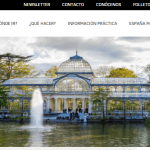Almost 40 students from 16 Latin American countries have participated in the courses named “Challenges and key points for reactivating tourist destinations in a time of new challenges imposed by the COVID-19 global pandemic, as per the Smart Destination model”, organised by SEGITTUR and the Spanish Agency for International Development Cooperation (AECID).
The course, which was participated in by countries such as Argentina, Brazil, Bolivia, Colombia, Costa Rica, the Dominican Republic, Ecuador, Honduras, Mexico, Nicaragua, Panama, Paraguay, Peru and Uruguay, highlights the growing interest from around the world, and especially from Latin America, in the Spanish Smart Destinations model, as it constitutes an investment in the development of a model for sustainable tourism.
The Chairman of SEGITTUR, Enrique Martínez, noted at the end of the course that during these days, the main challenges and key points for tourism management capable of boosting active policies to reactivate demand and respond to the current crisis, based on a governance model that would optimise public-private cooperation and supported by technologies that would serve as drivers for transformation, had been analysed.
Martínez highlighted that “Tourism management presents challenges and common problems, which are shared by destinations in both Spain and Latin America.”
Tourism challenges
Among the main challenges identified for tourist destinations were recovery during a pandemic, which involved health concerns, supply disruptions and price pressures, and sustainability, which meant taking on the challenges posed by climate change, the Green New Deal, the circular economy and the United Nations’ 2030 Agenda.
Further challenges included digitalisation, as a driver of tourism transformation during a time of growing uncertainty, and tourists, in terms of changes to their demographics and behaviour, as well as their new needs resulting from the current context.
The course also discussed key points for reactivating destinations from the Smart Destinations model. These included strengthening tourism governance, strategic planning and cooperation, the need to invest in Research & Development & Innovation and technology as a facilitator.
Big data and technology
Another of the topics analysed during the course focused on the opportunities offered by Big Data when modelling scenarios. It stressed that we are living in an information society, in which data isn’t just “the new oil”, but the basis upon which the decisions we have to make in our organisations, businesses, etc rest.
Finally, part of the course was dedicated to how technologies are assisting Smart Destinations to handle the COVID-19 crisis. During this session, the importance of incorporating technology into the tourism value chain, the challenge of digital transformation that destinations are facing and the main barriers to the use of technology within the tourism sector were noted. The main challenges which technology has helped to mitigate in terms of managing COVID-19 were also identified.





